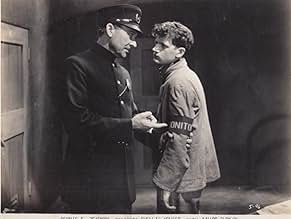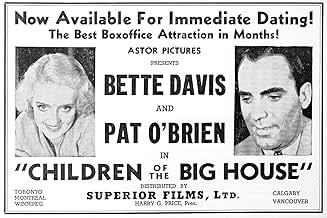Füge eine Handlung in deiner Sprache hinzuJimmy idolizes bootlegger Matt, and when he refuses to implicate his friend, he is sent to reform school. He befriends Shorty, a boy with a heart condition, and escapes to let the world know... Alles lesenJimmy idolizes bootlegger Matt, and when he refuses to implicate his friend, he is sent to reform school. He befriends Shorty, a boy with a heart condition, and escapes to let the world know about the brutal conditions.Jimmy idolizes bootlegger Matt, and when he refuses to implicate his friend, he is sent to reform school. He befriends Shorty, a boy with a heart condition, and escapes to let the world know about the brutal conditions.
- Regie
- Drehbuch
- Hauptbesetzung
- Auszeichnungen
- 2 wins total
- Jimmy Mason
- (as Junior Dirkin)
- Shorty
- (as Junior Coughlin)
- Henry Clark
- (as Charles Grapewin)
- Judge Robinson
- (as Wallace Clark)
- Superintendant Charles Thompson
- (as James Marcus)
- Lucy Mason
- (Nicht genannt)
- Boy at Trial
- (Nicht genannt)
- Detective
- (Nicht genannt)
- Cop on the Beat
- (Nicht genannt)
- Joe - Street Cop
- (Nicht genannt)
- Detective
- (Nicht genannt)
- Doctor
- (Nicht genannt)
Empfohlene Bewertungen
Junior Durkin plays a young man who in all innocence becomes involved with a charismatic bootlegger during the days of prohibition. Jimmy (Durkin's character) is arrested for being in the wrong place at the wrong time, and is sent to reform school, where things get worse. Some of the plot developments are not all that logical or plausible, but the story works in calling attention to the way that the young offenders are often treated simply as annoyances to be minimized, with insufficient attention given to constructive development.
Pat O'Brien is effective as the bootlegger, and Davis, though cast as a stock character, has a few good moments as his tough-minded girlfriend. The rest of the supporting cast, which features Charley Grapewin and Junior Coghlan, is solid, and the story moves at a good pace. Overall, it's a little above average for its time and genre, and it contains some ideas worth thinking about.
The story opens at a farm where Jimmy Mason (Junior Durkin) helps his widowed mother (Mary Alden) with the chores. The pleasant day turns out tragically when Mrs. Mason is suddenly struck and killed by a passing automobile. Left alone, Jimmy decides to come to the city and live with his Uncle Henry (Charley Grapewin) and Aunt Emma (Emma Dunn), landlords of an apartment building. There he meets one of their tenants, Matt Kelly (Pat O'Brien), who befriends the boy, and later introduces him to his girlfriend, Peggy (Bette Davis), a tough babe with a good heart, who takes an instant liking to this young teen. Jimmy, however, is quite naive and doesn't realize that Kelly is a smooth-talking, small-town operator and racketeer. Jimmy is soon offered a job by Kelly answering the telephone at his bootlegging headquarters. After showing him what to do and say, Kelly leaves Jimmy alone to tend to business. As Kelly slowly drives away, he looks at his rear view mirror to find the police barging in the place and arresting Jimmy. While in juvenile court, Jimmy believes that Kelly will come and speak on his behalf, and be released (no such luck). He refuses to identify Kelly as the man who hired him to the judge (Wallis Clark). Because of this, Jimmy is sentenced to three years in a state reformatory. While there, Jimmy becomes the victim of a cruelly-operated institution.
The supporting cast includes Junior Coughlan as Shorty, a reform school boy with a heart ailment who befriends Jimmy; Morgan Wallace as Frank Gebhardt, a crusading publisher wanting to improve reform school conditions; and James Marcus as the superintendent. While the opening credits presented on TV or video today give Davis and O'Brien star billing over Junior Durkin, the current opening credits are actually taken from reissue prints that capitalized on the stardom of both Davis and O'Brien, and is not the original opening credits as presented to 1932 audiences, hence the misspelling of Durkin's surname spelled Dirkin.
Although a reform school drama like this had been produced numerous times by other studios throughout the 1930s, "Hell's House," is really nothing new, in fact, a trifle slow at 70 minutes, handicapped by low-budget production values. Acting is good and reform school situations are grimly handled. However it's still interesting to see mainly because of the supporting actors of O'Brien and Davis, both of whom would become major film stars in later years, especially at Warner Brothers. (**1/2)
The most compelling part of the movie is Jimmy waiting for Matt while he's in court. The rest is a functional story for the boy although he's a little too clueless even at the end. His character needs to get smarter. Bette Davis is a supporting actress in this one. It's very early in her career. I would like Matt to be younger and his turn is a little too happy ending.
That reformatory brickyard is stacked to the skies and unlike anything I've seen. Should the mountainous stacks tumble, I doubt the boy stackers would ever be found. The movie's an interesting antique (1932) where O'Brien gets to show his fast-talking specialty as a pretentious bootlegger. But the real focus is Durkin, a likable kid, maybe too much so for the toughened last part. Sorry to say Davis's role looks like an add-on as O'Brien's conscionable girlfriend, and one that also gets a woman into a mainly male cast. It's still early in her career, but already Davis has that hard-eyed stare. And catch that toe-the-line stare-at-the-wall punishment misbehaving boys have to go through. That too is unlike anything I've seen.
Anyway, most of the runtime occurs inside the reformatory, minus the two top-billed players. Apparently, Durkin didn't have that same name recognition even though he gets the screen time. Too bad he died at such a young age and with so much to live for. His scenes with Junior Coughlin are unusually tender and moving, and dare-I-say, almost homo-erotic. All in all, the movie's in the prison-reform wave that occupied much of Hollywood at the time- e.g. Hell's Highway (1932); I Am a Fugitive from a Chain Gang (1932). Despite the many passing decades, the hour still holds interest, so shouldn't be passed up
Wusstest du schon
- WissenswertesBette Davis's first starring role.
- Zitate
Peggy Gardner: If you'd give the kid a chance, Kelly, he might amount to something, instead of always thinking about yourself.
- VerbindungenFeatured in V.I.P.-Schaukel: Folge #6.1 (1976)
Top-Auswahl
- How long is Hell's House?Powered by Alexa
Details
- Erscheinungsdatum
- Herkunftsland
- Sprache
- Auch bekannt als
- Juvenile Court
- Drehorte
- Produktionsfirma
- Weitere beteiligte Unternehmen bei IMDbPro anzeigen
- Laufzeit
- 1 Std. 12 Min.(72 min)
- Farbe
- Seitenverhältnis
- 1.37 : 1
























